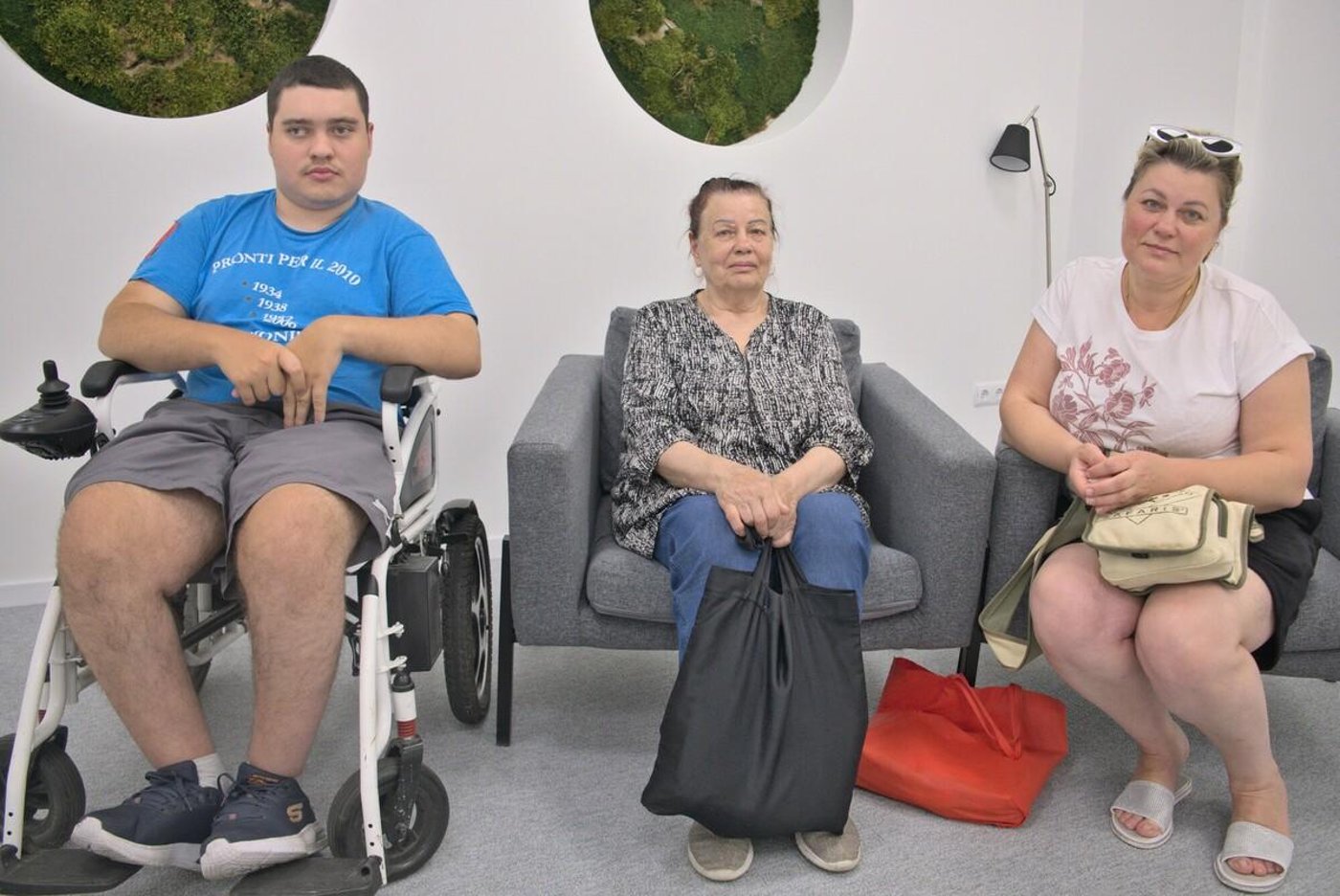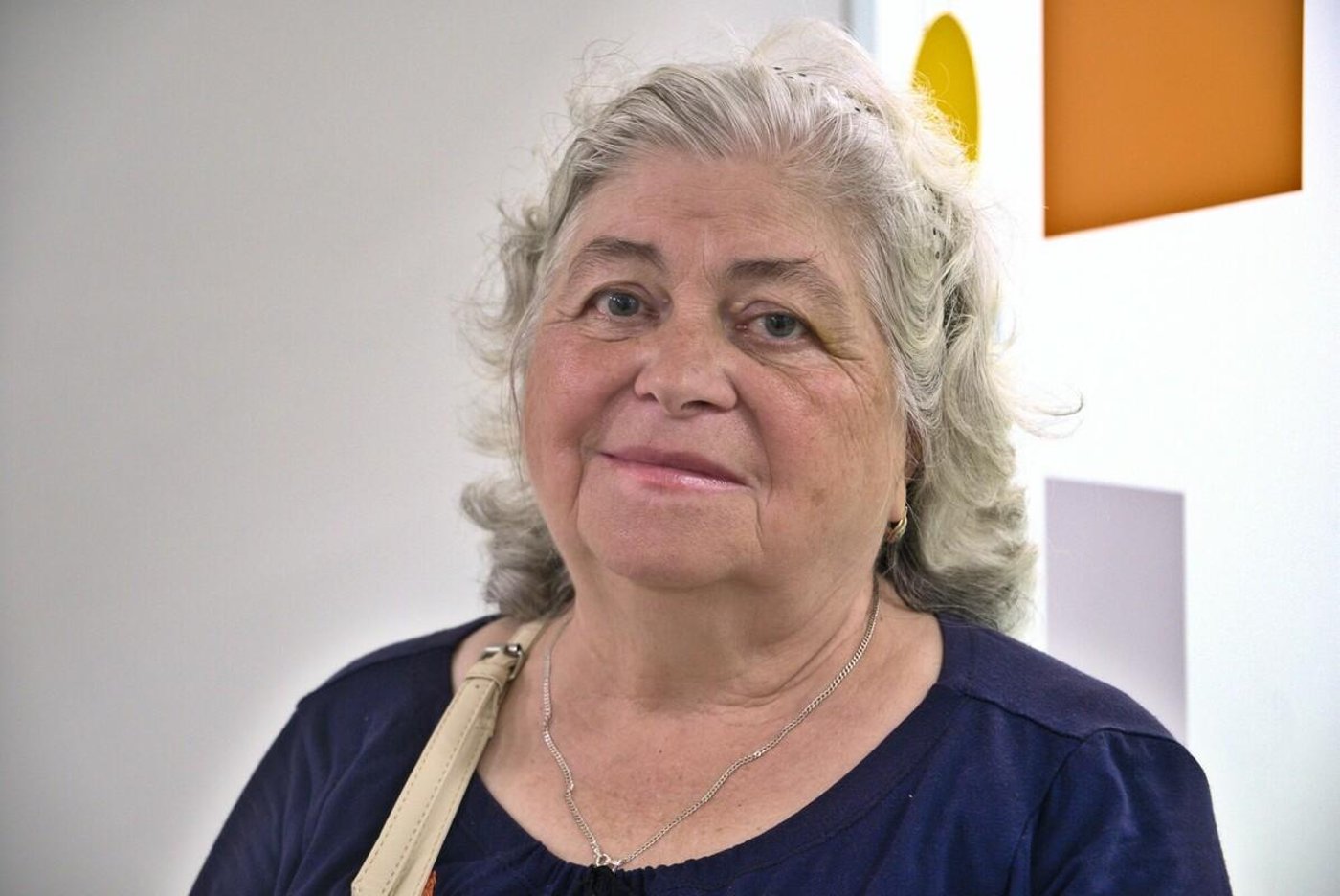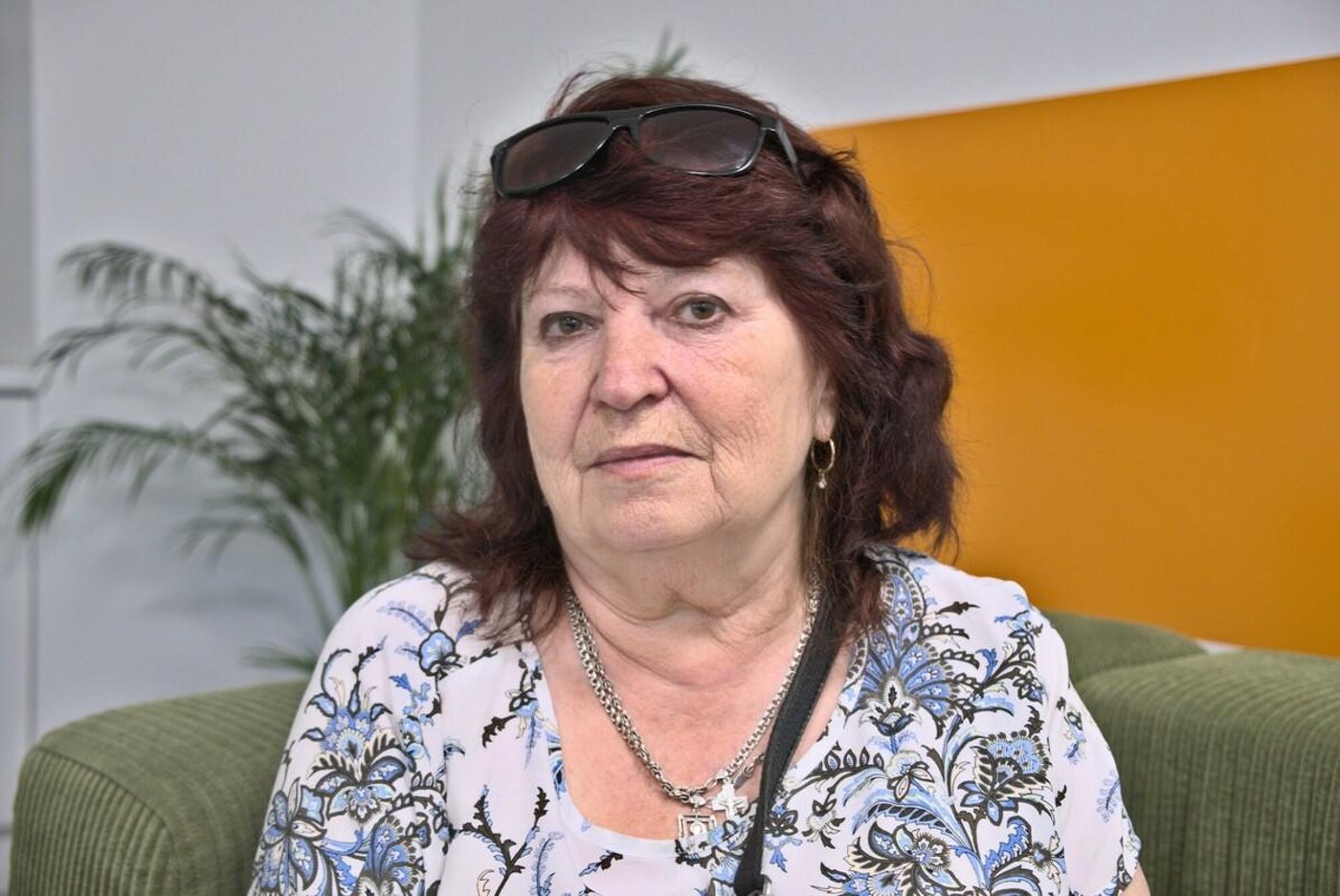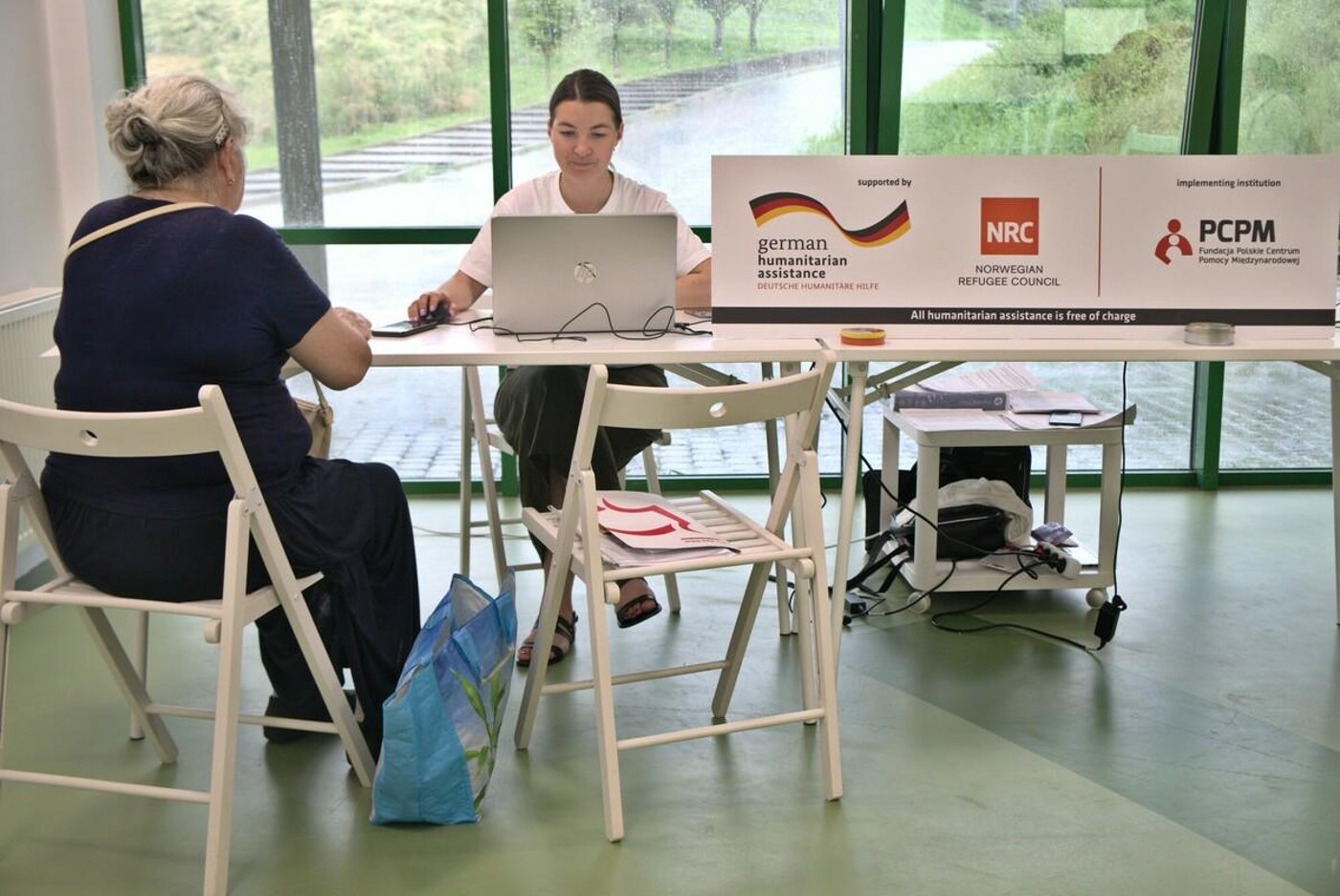Refugees from Ukraine shared their stories with us, speaking frankly about the basic needs they lack – healthcare, medication, rehabilitation, food, and accommodation. But above all, they expressed that they want there to be peace.
In 2023, the Polish Centre for International Aid (PCPM), in partnership with the Norwegian Refugee Council (NRC) and with financial support from the German Federal Foreign Office, implemented a targeted cash assistance programme. This provides individual and medium-term cash support for up to 6 months to refugees from Ukraine who are living with disabilities and who have limited access to social protection schemes. Enrolment for the programme was available in five cities across Poland. NRC spoke to some of the refugees who came to register in Lublin in June 2023 about their needs and hopes.

Victoria, accompanied by her mother and her son, Ilia from Vinnytsia oblast, south-west Ukraine
We arrived on 11 March last year. We had to flee from the war. We left our daughter behind with her husband. She has lost two children, tragically. Now she is pregnant again and September is the due date. But we have to be here. My son has a disability, and I must help him with rehabilitation and education, and try to preserve his life, which is most precious.
Right now, we have problems with our teeth. We have an appointment on 7 July. We need to address upwards of seven dental issues.
But you must wait a month for an appointment.
When we came, I cried a lot. People gave us clothes, food and medication. They helped us. It was so touching; we took it to heart.
Now we treat ourselves because of problems with our backs and legs. Everyone has needs – grandmother, mother, son. But it doesn’t matter; we are taking one step at a time. The most important thing is that we will have health and peace and that everything will be alright.
As they say – God brought us here. Because when we fled, we did not intend to come to Poland. We fled first to Vinnytsia, then Lviv. The explosions followed us. We reached Lviv and explosions were there as well. So where? Well, to Poland. We were very scared to come to Poland, and we were scared when we arrived.
But there are good people. At the border, people gave us food for free – I cried when I saw this.
You want to eat, and you think, “How can it be free?!” When I recall this now, it feels like it happened yesterday. Right, Ilia?!
[Ilia] has a dream. After all, there was the Covid-19 pandemic, then this war, so we haven’t been able to go anywhere – but he really dreams of going to the seaside. And he needs saltwater for his rehabilitation. It relaxes him and improves his muscle tone.
In Ukraine, they told me that when I reached 50 years old, I would receive up to 1,950 hryvnia (approximately 50 euros). How can you survive on this? Luckily, here you are given more, so you can arrange some care and then you can go out and earn money yourself. But either way it doesn’t matter. The main thing we hope for is that there will be peace.

Hanna*, a refugee from Kyiv
I come from Kyiv, Ukraine. I had major oncological surgery two years ago, but I could not undergo chemotherapy and radiotherapy therapy at home because the war began. I came here for this reason – to undergo further treatment at a Polish hospital.
I’ve been here for over a year now. I’m being treated in an oncology hospital. But I need help to continue treatment here because, in addition to cancer, I also have diabetes, which requires treatment. And besides all this, I need money to buy medicine.
I arrived on 3 April [2022], and I have been here ever since. I am very grateful to everyone for their help. Where I live, in Helios [student dormitory], and throughout the clinics and hospitals, people extend a helping hand – I am very happy with how they treat us.
I would love to stay here, but I do not know how to proceed, because I could be moved at any moment. Even if they [local authorities] extend our stay here in Lublin, we could be re-accommodated. We were in another hotel at first and then we were moved here. And it seems that talks are currently underway again, indicating that we might be moved somewhere else. That’s how it is – there is no permanent accommodation.
I can’t work anymore. I worked full time in Ukraine and I have 53 years of experience. But now, no. I will not be accepted for any work here. I’m struggling with these conditions. I need a rest. I’ve been learning and working all my life – I even earned a university degree while raising two daughters. Now I have three grandchildren and two great-grandchildren. I looked after everyone, took care of them, and attended various events with them. I think they’re proud of me.
Your help is crucial, both emotionally and financially, because my pension is tiny: I receive or 400 zloty (approximately 100 euros) per month. I am still trying to pay for my apartment and then there is a card payment minimum. And you cannot pay with card everywhere. That is why you need [Polish] zloty – for example when you go to the market or to the pharmacy. And this money is not enough: I have only 200 zloty left for the whole month.
I am very grateful to you [PCPM and NRC]. Come visit us in Kyiv when the war is over. There will be peace. I will host you – I will serve you Ukrainian borscht, dumplings and our famous booze.
If there is peace, all will be well. May God grant peace. We will come together again and we will celebrate. Feel welcome when you are in Kyiv. I invite you to drop by!
*Name changed to protect identity.

Alevtina Pavlovska from Nikopol
My name is Alevtina Pavlovska. I come from Nikopol, Ukraine. It is in the Dnipropetrovsk region, 4.5 km from the Zaporizhzhia Nuclear Power Plant, which today... evokes very negative feelings. Bombs were dropped on us every day, several times a day. We were forced to leave because there was no water in the city at all and we were under heavy fire from Grad [rocket launchers].
My house was ruined, as was my son’s apartment, with windows smashed and shards in the walls. So, as of today, we are left without an apartment. What else can I say? The situation in the city is very difficult. My son cannot leave because he is subject to military service and is still working at a factory. He stayed there with his family. My husband and I left because my husband needed heart surgery. In Dnipropetrovsk, he received a referral for surgery, but because of the war, it was impossible to perform it. Everything was shut down, including hospitals. We came here and, in Poland, we got the help we needed – which we were not counting on. My husband underwent two rounds of surgery, one in November and the other in December [2022]. Now he is in rehabilitation, and I hope that everything will be alright. I am very grateful to Poland and the government for welcoming us here.
Now we badly need help to purchase medicine. We need very expensive drugs for my husband’s rehabilitation, and all our money goes towards that. Besides that, we don’t buy anything. We can’t afford clothes or vegetables.
I have thyroid problems myself. I also need surgery.
My surgery has been scheduled for January [2024]. How we will carry on I do not know.
If everything goes well, the war in Ukraine ends and they give the nuclear power plant the all-clear, we will be able to return. But until then, we cannot.
Cash assistance will make our lives much easier, allowing us to buy medicine as well as essential items, such as fruits and vegetables. We need fruits and vegetables, full of vitamins, to support our rehabilitation. We cannot afford them at the moment.
With both of us in rehabilitation, we were given a flat in Chrzanów thanks to the accommodation allowance provided by the Polish government and we have been there for a month.
When it comes to Poland, I have only positive emotions. No one has ever commented on my language. People are friendly – they will show you around and guide you by hand. I was very impressed by the hospital. It is a Polish–American centre and everything is beautiful there. The doctors who work there are also super.

Ilkiv Vasyl from the area beyond Ukraine’s control
My name is Ilkiv Vasyl. I am a refugee. I came here because of the war, because Russia has occupied the city where I used to live. I live in Lublin now. I have had a disability since childhood and I am very sick. I have had problems with my apartment and with the living conditions over here. I need help now – that is why I came here: to ask for help.
I need funds for treatment, food and travel. As of today, I need funds to survive. Everything costs so much. I came to Poland last year [in 2022], at the end of the summer. People are people. They are like us, mainly.
I am receiving medical treatment here in Poland. For the hospital treatment itself, I use my PESEL [identification number], so it’s free of charge. But outside hospital, you still need to buy a lot of medication – much of it on repeat.
I wish for this war in Ukraine to end and for peace to come. If it were possible, I would stay in Poland, but I do not have my own apartment, and it is expensive to rent. It costs a lot.
Sign up to our newsletter to read more stories from around the world.


